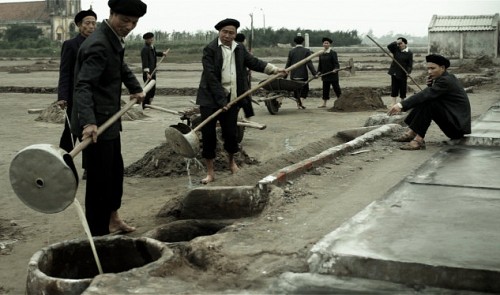A veteran Vietnamese-French film director has screened the latest part of his ‘trilogy’ depicting enslaved Vietnamese laborers in France during the 14th and 15th centuries in Hanoi last week.
‘Cong Binh – Dem Dai Dong Duong’ (Cong Binh – La Longue Nuit Indochinoise, or Cong Binh – Indochinese Long Night), an internationally-acclaimed documentary by seasoned Vietnamese-French director Le Lam, was screened on June 16 at L'Espace, 24 Trang Tien in Hoan Kiem District.
The film sheds light on the forgotten misery of 20,000 Vietnamese workers forced to work in France between 1939 and 1952.
Compelled to replace native workers in arms workshops, they were also forced to fight Nazi troops or undergo servitude.
Mistaken for mercenaries, many of them lived under constant threat of torture by Hitler’s troops and were often physically abused by French factory owners.
They were also the first to grow and harvest rice in Carmague, in southern France.
The documentary that debuted in France in 2013 gives voice to the workers and the ordeals they went through, facts largely hidden from the public.
‘Cong Binh – Dem Dai Dong Duong’ is the latest part in Lam’s trilogy, which also includes ‘De Che Tan Vun’ (Poussiere d' Empire, or Dust of the Empire), which vied for the Golden Lion at the 1983 Venice International Film Festival; and ‘20 Dem Va Mot Ngay Mua’ (20 Nuits et un Jour de Pluie, or 20 Days and One Rainy Day), shot in 2004 in Germany.
Lam, 68, explained that after he embarked on a career in film directing, he began researching why France, the UK, Portugal and Belgium jointly colonized and enslaved non-European nations between the 18th and mid-20th centuries.
“My studies indicated that the former European empires drained the resources and exploited laborers from their former colonies,” Lam noted.
In 2004, Nicolas Sarkozy, who was Minister of the Interior during Jacques Chirac's second presidential term, and served as France’s president from May 2007 until May 2012, proposed that the positive contributions of French colonialism to their colonies be included in French textbooks.
“The proposal sparked public outcry. I myself was also outraged,” the seasoned director recalled.
At that time Lam had just finished filming ‘20 Dem Va Mot Ngay Mua,’ and was looking for a worthy topic to use in voicing his protest against the proposal.
“I then discovered Indochinese workers’ pitiful fate a suitable answer to the Sarkozy administration’s new colonialism. A documentary, not a feature film, would do the job perfectly,” he explained.
Lam later clarified that the pioneer in exploring the fate of ‘Indochinese workers’ is Vietnamese historian Tran Nu Liem Khe, with her research published in 1988, not French journalist Pierre Daum, author of a book on the topic published in 2009.
The director, who has lived in France for over 50 years, wrote the script for his ‘Cong Binh – Dem Dai Dong Duong’ documentary in 2009, with the script soon persuading a producer of France’s ADR Productions.
“I was pressed for time then as the surviving workers were already over 90 years old,” Lam recalled.
He immediately returned to Vietnam for a two-one-month cross-country trip, during which he conducted surveys and interviewed 20 witnesses, two thirds of whom now resided in the central provinces.
Several ex-workers living in the southern region refused to be interviewed for various reasons.
After completing his filming, Lam rented a cinema to screen the four-hour documentary and invited only the film’s producer and one 93-year-old former worker.
The ex-worker was moved to tears after watching the actors reenact what he and his peers had been through.
Lam was then invited by the French Senate to speak about his documentary at a seminar in late 2013.
Ten delegates raised questions as to why the French government had failed to provide these former Indochinese workers with salaries or pensions for their contributions over 14 years.
“My film was meant to give the ex-workers and their families in Vietnam and France their dignity and well deserved recognition. Many of them were unfairly treated as traitors, but they were actually at the mercy of those in power during a special historical phase,” Lam stressed.
The director also featured Vietnamese water puppetry in his film, similar to the way Cambodian French director Rithy Panh used painted dolls, or pose-able puppets, as his vehicles of memory in ‘L'Image manquante’ (The Missing Picture), a 2013 Cannes-winning, Oscar-nominated documentary about the Khmer Rouge.
“My film was completed in 2012 and screened to the public before Panh’s film did. Panh was my student at the Institute for Advanced Cinematographic Studies, [a renowned French film school.] As a close friend, he also read my script in 2010,” Lam said.
“I tapped into the Vietnamese hallmark of water puppetry not only to guide viewers through my storyline but also to imply that the Indochinese workers were exploited and manipulated as puppets by the French colonialist government.”
Born in 1948 in the northern Vietnamese city of Hai Phong, Le Lam landed a scholarship to study in France in 1966.
At university, he majored in math and arts (painting) before trying his hand at motion picture.
His debut ‘Rencontre des nuages et du dragon,’ (Long Van Khanh Hoi), was introduced in a program for young directors at the Cannes International Film Festival in 1981.
He began lecturing in scriptwriting and directing at the Institute for Advanced Cinematographic Studies in 1986 and recently sat on the jury of ‘Canh Dieu’ (Kite) Awards, which are considered Vietnam's ‘Academy Awards.’























































